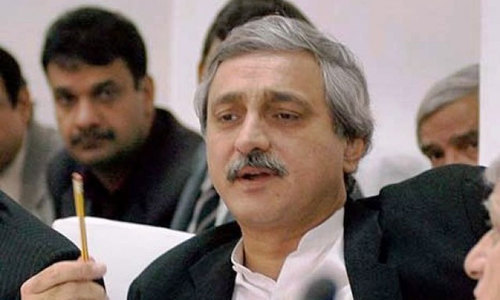ISLAMABAD: The counsel for Pakistan Tehreek-i-Insaf secretary general Jahangir Tareen told the Supreme Court on Tuesday that his client’s offshore company held around 12 acres of property in the UK, which was worth 4.7 million pounds in 2011. However, the counsel conceded that his client had never disclosed the property to the Election Commission of Pakistan (ECP) or the Federal Board of Revenue (FBR).
Unlike the Avenfield House properties owned by the Sharif family, Advocate Sikandar Bashir Mohmand maintained, there was a complete money trail for Mr Tareen’s Shiny View Limited, since the funds were remitted abroad while remaining within the confines of the law.
The property, known as Hyde House, was situated on Hyde Lane in Ecchinswell, a small village in Hampshire County, the counsel said.
The information was revealed before a three-judge Supreme Court bench, headed by Chief Justice Mian Saqib Nisar, which is hearing a petition seeking the disqualification of PTI chief Imran Khan and Mr Tareen for not disclosing their assets, owning offshore companies and the PTI being a foreign-aided party.
“[My client has] completely reconciled [his] wealth and have never taken any advantage,” the counsel said.
On a query, the counsel explained that after taxes, the price of the land was 2.2 million pounds. Shiny View Limited, registered in the British Virgin Islands, then entered into an agreement for the construction of a house worth 2.5 million pounds on the same land.
PTI leader’s counsel insists property is not an ‘asset’; SC judge wonders whether trust agreement is a ‘camouflage’
The total amount remitted from Pakistan in 2011 was 4.7 million pounds, he said, adding that the company was created on April 27, 2011, while a formal trust deed was finalised on May 5, 2011, naming Mr Tareen as the settler.
The acquisition of the land was carried out on May 10, 2011, the counsel said, adding that the settlers could not revoke the trust since EFG Bank (Pvt) Ltd was the trustee.
During the proceedings, the counsel said that he had not filed certain private documents regarding the trust deed and the tax returns of Mr Tareen’s children because they had not been arraigned in the case.
But the court said that these were not privileged documents, therefore copies should also be provided to the petitioner after filing the documents.
“I do not think there is a bar on the court not to see any document,” the chief justice observed, saying that the court needed to have a complete picture of how the company was created.
He also recalled that the petitioner had not challenged the validity or the formation of the offshore company, but the real question was the element of honesty; the court was interested in knowing how the money was remitted outside Pakistan.
“You have to demonstrate that you have no control over the property,” Justice Umar Ata Bandial observed, while Justice Faisal Arab reminded that it was Mr Tareen’s admitted position that the property was not declared before the FBR or in his nomination papers.
My case was that neither my client nor his children were the real beneficiaries of the property, the counsel argued. Rather, my client simply sent money to the trust, which was a lawful structure and the property was not disclosed because it was not his asset, Mr Mohmand maintained.
But the chief justice observed that the court was only interested in ascertaining whether the money had left Pakistan through lawful channels or not.
“You are saying that [he] created the asset for [his] children so they could live there, but they are not beneficiaries. You gave your money to the strangers, foreigners through a bank and continue to pay for the mortgage; what kind of arrangement is this?” Justice Bandial asked.
“A trust like this is a camouflage for hiding assets,” he continued, prompting the counsel to ask what benefit could Mr Tareen get from such a camouflage.
Citing the Foreign Currency Accounts Protection Ordinance 2001, the counsel argued that provisions under this law overrode certain regulations of the State Bank of Pakistan and allow the remitting of money abroad without any impediment.
He also maintained that his client had been disclosing his income since 2011 and tax authorities had never ever questioned him in this regard.
Published in Dawn, October 25th, 2017













































